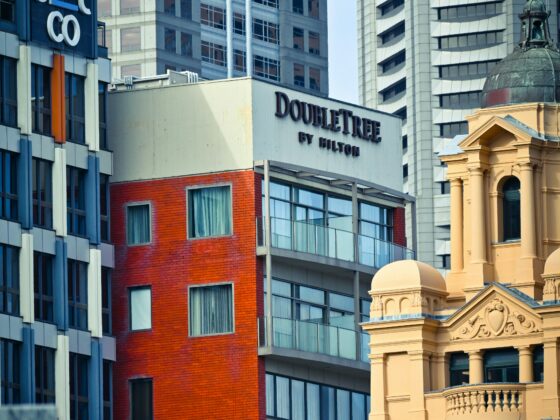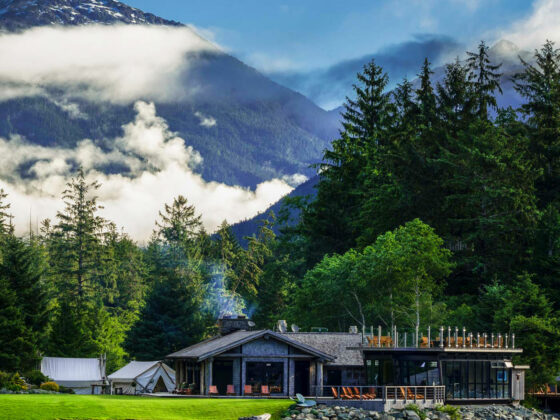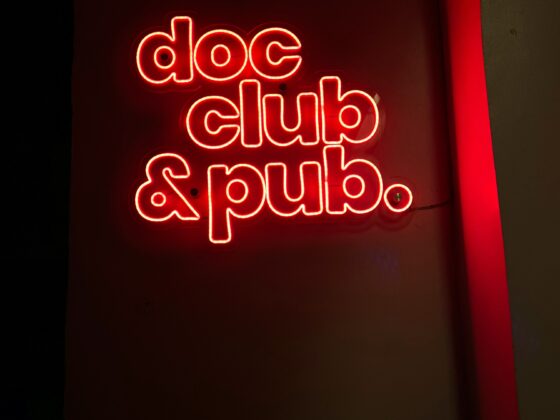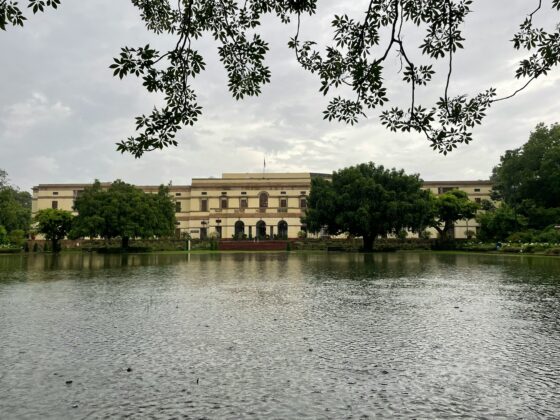Sean: I grew up in Dana Point, and so The Ritz-Carlton, Laguna Niguel sits, for those who don’t know, it sits on this bluff that overlooks a beach called Salt Creek. It’s beautiful, it’s magnificent, it’s really a community pillar. So if you grew up in the area, you know, you’re going, Grandma’s 70th birthday, that’s where you go, Easter brunch, things like that. So I just organically grew up going there as the, oh, we’re going to the Ritz. And then I also grew up surfing at Salt Creek Beneath. You know, I was on the surf team in high school, looking up to this beautiful building that almost looked somewhat unattainable. But it was always one of those things that was really cool. My father was an opening team member in 1984. So we had this big picture of The Ritz-Carlton Laguna Niguel carpet sitting in our living room. And so I grew up kind of looking at that. And he always talked about it, best job I ever had. And so I was actually working at Jamba Juice at the time. I was 17, and I kind of knew, hey, when I get to 18, that’s when the jobs open up that are a little bit more premium. And so I set my sights on, OK, I got to go to the Ritz-Carlton. How cool would that be to work there? And so, yeah, a week after my 18th birthday, I just walked in. I went to the front desk. You can imagine they were like, what are you doing? Go online and apply or something. And I didn’t take no for an answer. I went down to the spa. And then I just asked every desk I could. I stopped at the host stand and then this and that. Finally, the director of recreation at the spa, our director of spa and recreation, he said, hey, you know, we actually could totally use someone as a pool or beach attendant. I don’t know if you’d be willing to do that. And I said, yeah, absolutely. So I initially joined hospitality because it was a great job that I can get as an 18 year old at an establishment that I could always kind of look up to. But Less than 60 days in that role, I was hooked. The reason I was hooked is because, you know, when you’re at a hotel caliber and you have the cafeteria and this and the other, you run into folks all the time. And so I ran into gentlemen that looked so successful and looked so sharp and carried themselves so well. And I said, hey, you know, how did you get there? All of them had a similar story. It was I started in ballet. Oh, I started doing the same thing that you were doing. And so what does it take? You know, and it’s just you just you do well and you keep doing it and there’s endless growth. And so I was hooked. And the director of rooms at the time. I said, OK, what’s the next best step? And he said ballet. And so it’s kind of one thing. It was kind of a domino effect from there. And so through the course of eight years, I worked through nine different roles, all real focus on a guest operation. So the pool attendant, ballet, front desk, front desk supervisor, housekeeping supervisor, housekeeping manager, guest services manager, front office manager. And so kind of just grew, you know, over time. And I loved slash always will love the Ritz-Carlton. And if you would have asked me before I made a pivot, I was going to be there for life. I would tell people I bleed blue. It was something that I really, really, really believed in in terms of philosophy and culture. And so there was no part of me that was ever thinking about anything other than living the rest of my life there.
Josiah: What was it about the culture or the philosophy that resonated with you?
Sean: I think it was the trust that the organization gave in all the folks that worked there, right? I was gonna say all the ladies and gentlemen, because I still have that right here. It made you, and this is the one of the most important things that I’ve carried with me through my entire career, is it made you feel special, and it made you feel like you matter. And I think that what I loved most about it was When I initially joined, it was just me. I just felt that way because I was an hourly team member. Once I got to being a leader with the Ritz-Carlton, I realized that that was woven into the fabric of all of their leadership philosophies, and it wasn’t just about me feeling that way. It was about me as a leader making sure that the entire team feels that way. I thought that being a high priority was something really, really unique.
Josiah: It’s great to hear your perspective on this because I have talked to different individuals within the Ritz-Carlton organization and I love many of the kind of underlying principles of that culture. And so it’s great to hear about your experience as someone who is working there. Now, I kind of cut you off because you mentioned kind of also being at this point where after working there a number of years, you’re considering a change. How did you know, or how were you thinking about that? Because I think that’s something many of our listeners struggle with, to understand, you know, do I stay in the organization? Do I look for something different? What were you thinking about at that time?
Sean: And I connected with him via complaint. You know, I was a front office manager at the time and he was paying a really high premium rate for a premium suite. And so I fielded the first complaint and him being a long stay guest, we just made the, we made the relationship that, Hey, if anything happened, I was going to be the guy. And so. over the course of the next six or eight days, he was a vocal guest of ours, but in a respectful way. And, um, you know, that’s just what you do. And so we made a connection and towards the end of his stay, he still had three or four nights left. He invited me up to a suite. He said, Hey, could you come up here? And I’m thinking, Oh goodness, we’re going to really get it now. And so I get up there and he said, Hey, I don’t know if you know who I am. And I said, no. And he said, okay, well, here’s my card. You know, look me up. Um, would love to have breakfast with you. I actually own a hotel down in Mexico and I’ve been really trying to find someone who can come down and kind of elevate our service from a Ritz-Carlton standpoint, yada, yada. And so I said, wow, very flattering. And I went home and I looked him up with my girlfriend at the time, wife now, and found out that he was one of the five founders of Fox Entertainment. He produced Fresh Prince of Bel-Air and Beverly Hills 90210, and he founded Will Smith and Johnny Depp, and just really, really great career in his early 20s, 30s. And then I found out that he bought this asset that used to be The private estate of an Italian Duchess, Rosa Ferrari, in Mexico. Started looking at the picture of the property and then my wife, girlfriend at the time, Kelly, she chimes in and she says, what are we talking about? Go to breakfast with this gentleman. And so I had breakfast with him the next day and things happened pretty quickly after that. He could tell that I was moved to Mexico, and he said, look, let me fly you and your lady down there. Stay two nights, experience the hotel. If it seems like an opportunity you want to move forward with, it’s on the table. And here it is. And if not, no worries. And you get a vacation. And I just thought, what do I have to lose to go down there? And I just absolutely fell in love with what his vision of hospitality was, kind of built on what I had learned at Ritz-Carlton. And some folks told me, too risky, don’t do it. You’re with this established brand. Why would you ever lead? You built such a name for yourself. So much, so much noise. But my gut and my lady told me, hey, let’s do this.
Josiah: I love that because there’s so many elements. You’re focused on doing your job well. But I also love that individual as well, because I’m fascinated by what does great recruiting look like? And that’s just all out, just sales mode. I love it. I love that you experience it. Okay, so you end up taking the job, you end up kind of stepping into a new environment, a new role. How did that go?
Sean: It was the most rewarding experience that I’ve ever had in my life by a mile for a thousand reasons. I don’t even know where to begin with that question. I would say, you know, normally when you’re going through a transition, especially in the world of hoteliers, usually, you know, you work at a few hotels and you kind of understand what that kind of new transition looks like, new people and new processes and new room products. And so that’s all the same. But what I also was dealing with down there is dealing with a different culture. And so I spoke decent Spanish before I moved down there, but It was, you know, 70% of the team didn’t speak English. And so it’s less about language and it’s way more about culture. It’s way more about the lens that everyone saw service and hospitality through and that hotel and the leaders that had been there previously. And so it was a lot of what I learned quickly and what I kind of knew before I went down there is that everything’s really just based on respect. And so as long as you’re willing to roll up your sleeves and work really hard, the team responds really well or responded really well. And so the thing that worked best for me, it’s not a direct answer to your question, but the thing that worked best for me with that transition was just being with the team, cleaning rooms, checking guests in. They were so used to this like above property director of whatever that didn’t know how to say good morning that it allowed me to infiltrate the fabric of that team. And that was the only reason we were able to really elevate the services. But gosh, so much.
Josiah: I want to hear just a bit more about that, Sean, because I think whether it’s at the Ritz-Carlton or it sounds like this is something you have taken throughout your career, this notion of respect. I feel I had the chance to interview Horst Schulze earlier this year and respect came up again. And again, it was foundational to how he helped create the Ritz-Carlton. I think there’s something really beautiful and important here as it relates to hospitality leadership. I’m curious if you could speak a little bit more to this, either as somebody who’s kind of noticed this from others when you’re working for them, and then now you in this role you’re just describing, you found respect was critical. What does that look like practically?
Sean: Many things, but one thing comes to mind. It’s something that I am so passionate about and will never understand why so many senior leaders don’t do this and it’s a really simple one. It’s a time of day greeting. I cannot tell you how many times I’ve been walking with different folks, a million different hotels, even if I’m not working at that one, right? Maybe I’m in this new role now and I’m doing site tours at all the hotels in the county, whatever. there’s two different types of leaders there’s someone that any team member they encounter they make eye contact and say hello and there’s leaders that walk by like they don’t exist and I will never understand and that’s what it looks like to me there’s so many different ways to say respect but When I’m with a leader that we’re walking around their property and I see their team walking by and kind of, you know, hiding in the corner to let us walk through, it drives me crazy. And I actually, I’m obviously never, I’m not going to name this gentleman’s name, but I had one person one time, one point in my career, and he was like, why do you stop and say good morning to the gardeners? And It just really hurt my heart that that was the lens that he saw things through. This is a very successful person, way more successful than me, and yeah, I can’t believe that people think that, but I think that all my success can be attributed to the way that I treat others like I’d want to be treated. I know that’s kind of cliche, but I believe in it.
Josiah: I love it, man. So you heard into this role as the director of operations, is that right? Okay. And then what were, was there kind of a specific goal that you had kind of taking this role? I’m curious, kind of the responsibility and if you could speak to that a little bit.
Sean: Yes. And Kevin is one of my favorite people that I’ve ever, well, one of my favorite people just in general and definitely one of my favorite people I’ve ever worked for. And he really crafted this hotel from his years and years of traveling the world and knowing what a really great hotel means and experience and things like that. And so through that, he was really actively trying to get that Forbes five star recognition to kind of solidify the, hey, we are at this level. And pre my time, we’re never we were never able to get it. And so his biggest thing with me was, hey, man, I need this place to be five stars. So whatever you got to do, that’s that’s what you’re doing in this director of operations role. And so that was the the chalk, so to speak. And I really had my work cut out for me. So that was the goal.
Josiah: Sean, for people who are new to the industry, I wonder if you could speak a little bit to why is a Forbes five-star rating so important and impressive? There’s different rating systems out there. To you, why is this so special?
Sean: I am uniquely passionate about Forks Travel Guide because I’m on their standards advisory committee, so I really, really believe. Look, to your point, there’s a million ways to determine if a hotel is operating at a five-star level, but the reason that I think Forks Travel Guide does it the best is because they have these standards that act as an industry benchmark that are continually evolving to make sure that they’re relevant with the times, and more than that, We’re talking about things that encompass the entire experience. We’re talking about the room product. We’re talking about the facilities. We’re talking about the service. We’re talking about the taste of the food. We’re talking about the timing of the food. I think to someone who maybe is unfamiliar with how a rating system works, it encompasses every single part of the guest experience, and it puts them all together in a formula that’s points-based. I don’t know. I think the buttoned up answer is I think it’s the fairest way to be able to determine how high of a level you’re operating at. And as an operator, I promise I’m almost done. As an operator, you can trade off different things. You know, if you weren’t able to execute on this linen, but your facility was perfect, you still have the opportunity to get a five star because it is, you know, a rounded out exam. I don’t know.
Josiah: So you were hired into this role with this explicit mission to achieve this, right? It’s a big goal. It’s a big goal. How did you think about getting there?
Sean: What was nice is that I obviously, working at the Ritz-Carlton for so long, I had a really good understanding of what the standards were and how they could be met and an understanding of, you know, how to look at the room product and be able to tell this, this, and this, that. What we were lacking, which is every hotel’s got its own different challenges, right? The thing that Hotel Asensia didn’t have is this cultural fabric that the Ritz-Carlton has. And that’s something that I noticed immediately, right? We had no real HR team. Everyone was really proud of working there because it was such a beautiful place and the owner was really nice. But there was no real connection to a greater purpose and a greater vision. And so My biggest hire and the thing that got me there, honestly, was the director of talent and culture. I changed the name of HR to talent and culture and, you know, didn’t come up with anything legendary. I honestly, sorry, Rich Carlton, but I took everything, you know, leader of the quarter, team member of the quarter, leader of the year, you know, a quarterly outing, very simple, basic stuff. But to that team down there, it was groundbreaking. And I became this person that was bringing all this stuff, which I wasn’t really doing. I was just celebrating people that were already doing a good job. And so created culture and then attached the team to the goal of five stars and based it around something that they could be proud of. And especially in that culture, there’s a lot of pride in that culture. And so as soon as everybody knew we were playing a game and we were playing to win it, honestly, I’m not taking credit for anything. My director of housekeeping, Carla, As soon as she knew, hey, this was the test, here are the numbers that I need to hit, no one was stopping her. And look, I’ve been gone for over two years. Every single year, they pass that five star since I left.
Josiah: Amazing. And it was the only Forbes Travel Guide five-star independently owned hotel in the country, right?
Sean: Correct.
Josiah: So this is a really unique accomplishment. A year after taking the job as Director of Operations, you get promoted to General Manager. What did you have to learn, or how did you feel like your leadership style had to adapt to move into that GM role?
Sean: A lot. You know, obviously, the trajectory was much, much quicker than, I would say, our, I don’t want to say, the traditional, right? The traditional trajectory, it was different. And so that was Kevin’s way of saying, hey, you passed the bar, you got us five stars, you could stay here and, you know, lead the helm for a while. And so it was really flattering and it was really great. But, you know, the one thing that I didn’t know I had to learn, but that I was forced to learn is when you get that role, you just end up dealing with every single stakeholder that’s involved. And those stakeholders are all over the map and there’s no rule book. And so it went from being immersed in guest experience and running the hotel operation, which I felt incredibly confident about, to dealing with legal and dealing with compliance and trying to figure out how to distribute to the owner and what’s EBITDA. And it just immediately, I think the answer to your question is finance is legal. Just things that you don’t have to deal with when you’re a director of operations dealing with the guest experience.
Josiah: And I mean, speaking of EBITDA and some of these financial metrics, they were up across the board, right? Just between 21 and 22, EBITDA was up 6%. And you think about the impact that has on the value of the business, the hotel, very significant, very significant. I feel like as we’re recording today, it feels like so many in hospitality are challenged by driving profits and kind of what is this? It feels like a tension in some regards between delighting your guests and earning these incredible reviews, whether it’s from guests or from more standard systems, and then driving profits. How did you think about that tension? Because it seems like you were delivering both there.
Sean: Well, as much as I want to take credit, you are in a unique situation in Mexico because your operating costs, most of them are in pesos, and then your income are in dollars. So your margins are sincerely helped there. But the focus was really about ADR. And so basically we were using our IADR to be able to buy the surprise and delight items, right? And so every guest was getting a gift upon arrival and upon departure. We were delivering fresh pastries and fruit and coffee to every single guest room every single day. We were doing events. We had programming that was excellent and everything was complimentary. The only way we could afford those and still manage the flow through was was through ADR, and so we got to a point where we did have to sacrifice some occupancy for that ADR, and it’s been a dialogue that I’ve had with a lot of people, and people sit on different sides of the fence, but I’m a very much, I would trade occupancy for ADR any day in a premium setting, because for me, as the operator, it allows me to protect the margin, and I get to provide better service. If I got more rooms that are simply sitting empty, but I’m still making the same top line, then my team is free to do what they do best and interact with guests. So the best, the success, the financial success story that Senseia was for sure all driven through ADR, not all, but a lot of it was driven through ADR.
Josiah: Incredible. I mean, what a success story. So you put up incredible numbers there. You achieve the goal that you were hired to achieve. You spend about three years, right, kind of building that hotel to where it was and remains performing quite well. And then you make another career change. I wonder if you could tell our listeners the story behind that.
Sean: Absolutely. Well, the last year I was working for Kevin and Asencia, we were targeting another hotel. And so we actually looked all around Mexico, ended up in France, and we bought a property in France and restored that. And so through this time, you know, taking a turn away from professional and kind of towards personal, I was living my dream life. working for this really incredible, you know, visionary guy who awarded me opportunities and got to travel the world and et cetera, et cetera. Well, I wasn’t as present as I should have been with my relationship with my at that time fiance and now wife. And so it just got to the point where. It was pretty clear I could have this amazing career and maybe open a third hotel after France and Spain or whatever, but the whole starting a family and surfing every morning and having my coffee at the same time, it wasn’t in the cards for me. So I had to look at myself in the mirror and say, how can I still do this thing that I know I’m going to do for the rest of my life, and that I know I’m passionate about, but still be a really great husband and a really great father? And what that looked like was trying to get back to the US. And so, once again, just really organic timing. I used to work for a gentleman named Dave Elkhorn, who was my director of rooms when I was 21. And he was working with Auberge, and he had reached out to me on an afternoon just to say, You got this opportunity. I know you’ve been doing well in Mexico. I don’t really know what your, looks like whatever, but would love to talk. And of course I respond in five seconds. I’m like, can we talk? And so we talked the next day and their director of rooms role had opened at the brand new Oberge in Santa Barbara and just seemed like the perfect opportunity to get my wife and I back in the U.S. Santa Barbara somewhere that we both would love to live in. And yeah, it was kind of my entrance back into the U.S. and the pivot that I needed to make.
Josiah: I appreciate you sharing that because not a lot of people talk about the personal side and it’s so interconnected with professional, right? And life is long, right? And so I appreciate you speaking to how much you love the work, but at the same time, recognizing that, you know, you want to kind of show up in other areas of your life as you want to, right? It’s so important. It’s so important. Amazing. So you step into this kind of new role, very different. Well, it’s a different context, different place. What were you hired there to do? And I wonder if we could speak a little bit about kind of the some of your goals heading into that role.
Sean: Sure. It’s the hardest experience that I’ve ever gone through professionally, by far. And it was something that has benefited that that experience has benefited me tremendously. I’m so thankful for it. Now, it was hard to feel the gratitude in the beginning because you know you go from managing this whole thing and being the key decision maker and you know you work directly for the owner and you kind of you know, unfortunately, you develop a little bit of an ego. And unfortunately, I have to admit that. And I think I enter that space thinking, OK, I am this guy and I’m still going to continue to be the guy. And I realized that I wasn’t. And so what I needed to do is I had to kind of recalibrate my goals. And so instead of driving EBITDA and ownership distribution, it was more of, OK, How do we make sure the front desk manager is thriving? And how do we make sure this team is happy and that the front desk is fully staffed enough so that a guest isn’t waiting in line? So it was just this immediate priority shift, but what was really unique about it is it let me take kind of my whole career package it up and then take a few steps back, which I probably needed to do anyway and work on things that I already had felt confident about, but through a different lens and just really, really kind of sharpening the tool from kind of a more foundational sense of what services, you know, I kind of went so big picture so quick. It was really nice to be able to come back and just say, OK, I call myself an expert on the basics, but am I? And so it was really, really nice. You know, I spent almost 18 months really immersed in the operation doing check-ins you know towards the end of that 18 months I was able to get out of it because the team was built but you know the first 10 months I was I was at that desk doing check-ins and it was a really humbling experience.
Josiah: But I appreciate how that is connecting with threads throughout your career. And again, I hear you thinking about the big picture here, right? And it’s not just about does every title have to be a bigger title, right? You’re thinking about life holistically, you’re thinking about career development. And so 18 months there, and then very recently, you stepped into a new role. How did that come to be?
Sean: So so excited. I have no words to describe how I mean, I’m sitting in this office right now and just, oh, it’s been amazing. I just I don’t know. Look, I don’t know how the universe works, but for some reason it every experience has felt to me like it’s kind of led to the next thing. And so. kind of towards the end of the fall, I was just thinking on, OK, hey, 2025, I kind of need some some growth, you know, less about anything other than I took the step back. I’m back in the United States. I got to have some sort of plan of where Sean is going. And I didn’t really know what that looked like. And so just put a put a few feelers out there. And one of them led me to this really organic opportunity in San Diego, back in the independent world. And the easiest kind of answer to the to the why question is I saw Asensia again. I said, hey, you know what? I had to give up Asensia. I had to give up the entrepreneurial, had to give up the independent hotel that can be impactful. It can still drive ROI and a great guest experience. It doesn’t have to be one or the other. And yeah, I ran towards it as fast as I possibly could. And not running away from O’Bears, I love O’Bears. It just, it was, you know, staying in the traditional setting, it was another five or six years for me to get back in a seat where I can make decisions and make impact. And for me, this was, my wife’s gonna be happy, I can still surf every day, I get to do exactly what I wanna do in a place that, you know, helps me be me and authentic. And yeah, just all the right things.
Josiah: I appreciate you sharing your story. Before we started recording, you were sharing a piece of advice that it sounds like has stayed with you. You mentioned just in the most recent career transition, thinking about kind of what’s next for Sean. And I think you were mentioning this more maybe in a personal brand perspective, but you got some advice from someone that was something to the effect of, you know, you got to kind of think about yourself to some extent. And I’m butchering the paraphrasing of this, but would you mind speaking to that a little bit?
Sean: Sure, yeah. My first general manager at Ritz-Carlton and he said, hey, you know, you’re always going to work for a brand and right now you work for Ritz-Carlton and that’s great and Ritz-Carlton is a great brand, but you also have to understand you’re continuously building your own brand and you’re always also going to be working for Sean. And so, Yeah, to your point, I’ve never ever ever forgotten that and I do think and I’m glad that you said that again because I do think it’s something that so many people miss when they’re coming up in their careers. They’re so attached to this fabric of whatever organization they’re in and that’s okay. You could be proud of the organization you work for but You should be more proud of who you are and what you bring to the table, because as soon as we’re treating the organization like we’re lucky to be there, I think we’re missing the point. The organization should be making you feel like they’re lucky to have you there. And so, yeah, I think it’s super important. I think it’s a missed…
Josiah: I’m always trying to recruit people into hospitality or get them to stay in hospitality. And I think our conversation here where you have kind of shared the story of building a remarkably compelling career in hospitality is a great way to do that. But I guess for people listening, hopefully one day they get the chance to work with you in some capacity. But I wonder if you could speak a little bit to the potential of a career in hospitality, kind of what keeps you in it, why you see it as compelling as a career option for others that are listening.
Sean: I love hospitality. So many reasons. I would say for someone that was interested in potentially making it a career, if you’re someone who believes in being a force of good for the world, then hospitality is a place where you could do that every day in dozens and dozens of interactions. And every single interaction that you have, it’s an opportunity to enhance someone’s life. What’s so great about that is as you progress in the industry, the net just gets bigger and bigger. You have team members, and you have guests, and you have vendors. I think the other thing too is everyone’s always looking for this career that has consistent growth built in, and it’s a really hard thing to find. With hospitality, it’s something that’s got 500 plus different avenues. So it’s not you don’t have to put yourself in a box in hospitality. There’s something in this industry that kind of works for everybody and every type of thinker. You know, maybe you’re someone that’s really driven by numbers. You’d be brilliant at finance. But, you know, the best director of finance I ever had. You’d never know he’s a numbers guy because he’s he’s in hospitality. So, God, it’s such a hard question. I think you have the ability to deal with humans every day and impact people’s lives in a good way.
Josiah: I love it. So we have a new year ahead of us. You’re working on a really interesting project. I’m curious, you know, what else is on your mind? Are you thinking about, excited by? I feel like there’s so much ahead for you.
Sean: I’m excited most about building the team and the 39 room hotel allows me the opportunity to really connect with guests. But more important, this will be the first hotel I’ve ever worked at where I’m generally going to have a relationship with every single person that works at that hotel and I will be involved in their hiring process, which is just which is just unique, you know, to be able to build the, and we only have four folks that work on the team right now, and we’re all really close. And as we get towards our February opening, I’m going to be able to hire everybody and take them out to breakfast. And there are these moments when I’ve started at new companies or, or whatever, and I’ve always been like, gosh, I wish this, I wish that I wish this. And so my goal is to be able to foster this feeling of I feel important, I feel special. You know, I want every person to feel like I felt as an 18-year-old at the Ritz-Carlton Lagoon in Galveston. That’s what I’m most looking forward to.







